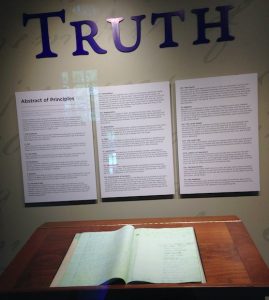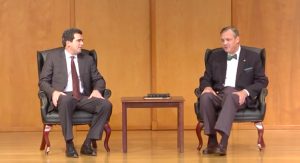Yoo shal nót behr fols wit-nus; so said phonetically. “You shall not bear false witness against your neighbor” (NASB; consult Jesus, Luke 10:29–37, on the meaning of neighbor). “You shall not give false testimony against your neighbor” (CSB). “Do not accuse anyone falsely” (TEV). “You shall not be a lying witness against your neighbor” (J. Douma). Simple enough. Our words must be truthful—not truthful as we see it or truthful as we want it to be—but truthful—period.
Moreover, God intends us to practice truthfulness toward one another. “God has set two natural fences to keep in the tongue,” wrote Thomas Watson in the 17th century, “the teeth and lips; and this commandment is a third fence set about it, that it should not break forth into evil.” Yet the human heart often shows the propensity to stretch, twist, shade, and distort what is truthful in order to shore up one’s position, seek revenge, cover failures, and vaunt pride at the expense of another. But the 9th commandment is clear: “It forbids anything which may tend to the disparagement or prejudice of our neighbor” (Watson).
Okay, that looks good on paper, and we all agree with it. Right? Yes, we agree that we do not want someone else to give a false word about us. But what of the shoe on the other foot? Do we fence in the natural tendencies to disparage others because we’re conscious that it dishonors the Lord and wounds our brother? Are we as relentless in reeling in our words that would bite and bludgeon, as we want others to be toward us?
Early in pastoral ministry, just before the worship service began, a deacon told me that someone in the community (the details made that obvious) sent letters to a few of our ladies, maligning them with false charges. That’s all that I knew about the letters. But in God’s providence, my sermon that morning dealt with speaking truth. Ironically, after the service, one of the ladies that had received the attack note accused me of writing it! She had no reason to accuse me of sending the notes but it seemed that since she was not too keen on this young fellow who preached expositionally and probably a little too long, it seemed worth breaking the 9th commandment.
Admittedly, we may sometimes wish that Moses had come down from the mountain with a few caveats attached to the 9th commandment. A little wiggle room to show the extent of our vocabulary in cutting another in our sights down to size would be convenient. But to do that, we need to make sure that nothing is off limits. If the evidence doesn’t fit the charge, that’s no problem, we can manufacture the evidence. But the 9th commandment stands in the way.
On several occasions I’ve had different brothers attempt to argue with me that I believed something that I don’t believe. One time I stood in a parking lot outside a big box store with a brother that I highly regard (and still do), as he tried to tell me that my church practiced elder rule. Prejudiced by what he’d heard others in his community say about my church and me, he sought to squeeze me into agreement. Fortunately, my position of plural elder leadership within a congregational framework is clearly in print for anyone to see. I let him know that he was mistaken and encouraged him to read the details of what I believe before continuing to misrepresent me. Saying otherwise would constitute breaking the 9th commandment. He received my comments graciously.
But what if we have a theological disagreement with a brother? Shouldn’t it be permissible to throw everything that we have at him? I mean, we want to correct him so that he holds the right position—our position. Shouldn’t we silence him by our savvy and brilliance? Didn’t God give us the ability to argue and verbally slice away to the nth degree for our theological purposes? Shouldn’t we stand for the truth (by our interpretation) and forget about Christian charity in such cases? Even if we have to make up what we think that person believes, shouldn’t the end justify the means?
Shouldn’t we get within firing range of our theological opponent so that we dispose of his arguments with one vicious blow? Thomas Watson quoted the church father Jerome who said, “The Arian faction made a show of kindness; they kissed my hands, but slandered me, and sought my life.” Under pretense, they got within firing range and turned their artillery loose. Not much has changed since then.
“You shall not bear false witness against your neighbor.” Have I been guilty? Shamefully, I’ve repeated what someone else has said without knowing the certainty of the accusation; I’ve imagined what another might say in light of my theological convictions—and theirs, and uttered my smug, malignant comments; I’ve considered my infallible x-ray vision into the heart of one disagreeing with me enough reason to thrash him viciously. O Lord, be merciful to me.
Let’s take the high road that the call of Jesus Christ in the gospel demands, even with blogs, tweets, Facebook posts, conferences, letters to the editor, and conversations. “Let all bitterness and wrath and anger and clamor and slander be put away from you, along with all malice. Be kind to one another, tenderhearted, forgiving each other, just as God in Christ also has forgiven you. Therefore be imitators of God, as beloved children; and walk in love, just as Christ also loved you and gave Himself up for us, an offering and a sacrifice to God as a fragrant aroma” (Ephesians 4:31–5:2).
So the next time that the teeth and lips don’t quite seem to be enough to restrain the tongue from falsely accusing a brother, let the 9th commandment do its work. We can disagree with one another—even strongly disagree—but we need not bear false witness in the process. Since we’re forgiven people in community with forgiven people, let us not act like the false teachers who spoke by the “trickery of men, by craftiness in deceitful scheming; but speaking the truth in love, we are to grow up in all aspects into Him who is the head, even Christ” (Ephesians 4:15–16).

































